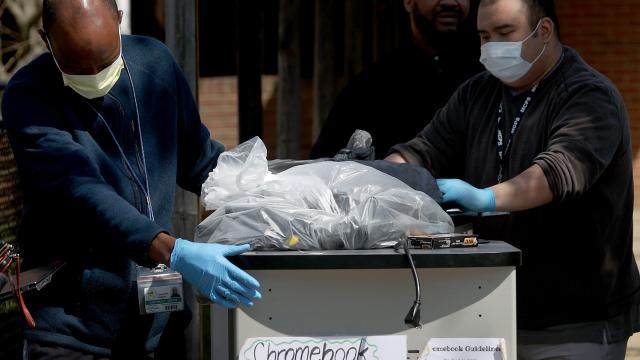With the majority of the US now at home, many of them working or attending school remotely, it’s not just critical that every household member who needs a computer and internet access has it—it’s a basic necessity. For many non-profits focusing on providing technological resources, that not only means providing individuals with computers and digital literacy courses, but working with other non-profits to maintain an effective supply chain in an absolutely gruelling time.
“We’ve seen a huge uptick in the need for products and programs that allow non-profit staff to work remotely, particularly those related to communications and collaboration,” says Cameron Jones, Vice President of Solutions and Services at TechSoup. Much of that includes help with setting up secure access to servers in physical offices and online file storage, and also help with using software like Zoom, Microsoft Office, Docusign, and Google. TechSoup also provides free webinars and blog posts to help get individuals and companies new to remote work up to speed on the best practices of using these various tools.
One of the hardest-hit demographics are foster and at-risk youth. Jones says they have the largest need for computers to access online education. “There’s obviously been an increase in need for laptops and internet connectivity for those who don’t have a home service […] We’ve had many emails from non-profits trying to support remote learning in disadvantaged communities.”
According to Matt Cherry, Development Director at John Burton Advocates for Youth (JBAY), a San Francisco-based non-profit, most foster youth in school and college do not have their own computer. They have to rely on their school, library, or friends for access to one. Now that they are cut off from those resources due to the pandemic, they face a greater risk of falling behind academically, failing classes, or dropping out of school all together. “Foster youth have often overcome enormous obstacles to even reach college and they generally don’t have the family, social networks, or other resources that other students can often call on when they need help,” says Cherry.
“As of Tuesday, we had sent 932 laptops, and 1,406 phones, to foster youth in college who would otherwise have no way to access their courses. We are working on getting another 2,000 laptops out in next couple of weeks.” The students pay nothing for these resources provide by JBAY. JBAY absorbs the cost, at around $US175 ($288) per laptop, and coordinates the shipping.
JBAY also works closely with TechSoup and another non-profit, iFoster, to source those laptops and phones. TechSoup, in turn, works closely with its tech partners like Dell, Lenovo, HP and Mobile Beacon to source products, but since a lot of manufacturing of those products are done in China, demand for PCs is greater than what can be supplied at the moment due to the global pandemic.
Human I-T, a Southern California-based non-profit, is trying to address the same need by working directly with school districts, other non-profits, and individuals. Nearly a week ago, Human-I-T started the process of connecting schools, colleges, and students with computers. 300 laptops went to LA Community College students and Human-I-T is currently looking to give away 11,000 total computers to the LA Community College District system, in addition to trying to secure more funding to give away more laptops to individuals in need of one. The non-profit is constantly on the look out for more ways to fund or source laptops to meet the requests they receive on a daily basis.
To help meet that need, Human-I-T enlists the help of volunteers to refurbish computers and sell at extremely low prices. The non-profit also provides assistance in connecting individuals and families to low-cost internet access, and it has a Covid-19 response fund to provide families with hotspots so they can access the internet.
“About a dozen school districts, including LAUSD, LACCD, and Long Beach USD, have reached out to us to try and supply their students with computers and affordable internet. We are looking to supply thousands of computers to these low-income students in a short time which is no easy task,” says Marcos Cronander, Brand Manager for Human-I-T.
